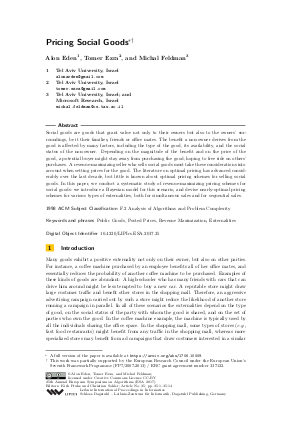Pricing Social Goods
Authors Alon Eden, Tomer Ezra, Michal Feldman
-
Part of:
Volume:
25th Annual European Symposium on Algorithms (ESA 2017)
Part of: Series: Leibniz International Proceedings in Informatics (LIPIcs)
Part of: Conference: European Symposium on Algorithms (ESA) - License:
 Creative Commons Attribution 3.0 Unported license
Creative Commons Attribution 3.0 Unported license
- Publication Date: 2017-09-01
File

PDF
LIPIcs.ESA.2017.35.pdf
- Filesize: 0.56 MB
- 14 pages
Document Identifiers
Subject Classification
Keywords
- Public Goods
- Posted Prices
- Revenue Maximization
- Externalities
Metrics
- Access Statistics
-
Total Accesses (updated on a weekly basis)
0PDF Downloads0Metadata Views
Abstract
Social goods are goods that grant value not only to their owners but also to the owners' surroundings, be it their families, friends or office mates. The benefit a non-owner derives from the good is affected by many factors, including the type of the good, its availability, and the social status of the non-owner. Depending on the magnitude of the benefit and on the price of the good, a potential buyer might stay away from purchasing the good, hoping to free ride on others' purchases. A revenue-maximizing seller who sells social goods must take these considerations into account when setting prices for the good. The literature on optimal pricing has advanced considerably over the last decade, but little is known about optimal pricing schemes for selling social goods. In this paper, we conduct a systematic study of revenue-maximizing pricing schemes for social goods: we introduce a Bayesian model for this scenario, and devise nearly-optimal pricing schemes for various types of externalities, both for simultaneous sales and for sequential sales.
Cite As Get BibTex
Alon Eden, Tomer Ezra, and Michal Feldman. Pricing Social Goods. In 25th Annual European Symposium on Algorithms (ESA 2017). Leibniz International Proceedings in Informatics (LIPIcs), Volume 87, pp. 35:1-35:14, Schloss Dagstuhl – Leibniz-Zentrum für Informatik (2017)
https://doi.org/10.4230/LIPIcs.ESA.2017.35
BibTex
@InProceedings{eden_et_al:LIPIcs.ESA.2017.35,
author = {Eden, Alon and Ezra, Tomer and Feldman, Michal},
title = {{Pricing Social Goods}},
booktitle = {25th Annual European Symposium on Algorithms (ESA 2017)},
pages = {35:1--35:14},
series = {Leibniz International Proceedings in Informatics (LIPIcs)},
ISBN = {978-3-95977-049-1},
ISSN = {1868-8969},
year = {2017},
volume = {87},
editor = {Pruhs, Kirk and Sohler, Christian},
publisher = {Schloss Dagstuhl -- Leibniz-Zentrum f{\"u}r Informatik},
address = {Dagstuhl, Germany},
URL = {https://drops.dagstuhl.de/entities/document/10.4230/LIPIcs.ESA.2017.35},
URN = {urn:nbn:de:0030-drops-78717},
doi = {10.4230/LIPIcs.ESA.2017.35},
annote = {Keywords: Public Goods, Posted Prices, Revenue Maximization, Externalities}
}
Author Details
References
-
Nima AhmadiPourAnari, Shayan Ehsani, Mohammad Ghodsi, Nima Haghpanah, Nicole Immorlica, Hamid Mahini, and Vahab Mirrokni. Equilibrium pricing with positive externalities. Theoretical Computer Science, 476:1-15, 2013.

-
Hessameddin Akhlaghpour, Mohammad Ghodsi, Nima Haghpanah, Vahab S Mirrokni, Hamid Mahini, and Afshin Nikzad. Optimal iterative pricing over social networks. In International Workshop on Internet and Network Economics, pages 415-423. Springer, 2010.

- Saeed Alaei. Bayesian combinatorial auctions: Expanding single buyer mechanisms to many buyers. In IEEE 52nd Annual Symposium on Foundations of Computer Science, FOCS 2011, Palm Springs, CA, USA, October 22-25, 2011, pages 512-521, 2011. URL: http://dx.doi.org/10.1109/FOCS.2011.90.
- Saeed Alaei, Jason D. Hartline, Rad Niazadeh, Emmanouil Pountourakis, and Yang Yuan. Optimal auctions vs. anonymous pricing. In IEEE 56th Annual Symposium on Foundations of Computer Science, FOCS 2015, Berkeley, CA, USA, 17-20 October, 2015, pages 1446-1463, 2015. URL: http://dx.doi.org/10.1109/FOCS.2015.92.
-
Ryan Calo. Digital market manipulation. Geo. Wash. L. Rev., 82:995, 2013.

-
Ozan Candogan, Kostas Bimpikis, and Asuman Ozdaglar. Optimal pricing in the presence of local network effects. In International Workshop on Internet and Network Economics, pages 118-132. Springer, 2010.

-
Shuchi Chawla, Jason D. Hartline, and Robert Kleinberg. Algorithmic pricing via virtual valuations. In Proceedings of the 8th ACM conference on Electronic commerce, pages 243-251. ACM, 2007.

-
Shuchi Chawla, Jason D. Hartline, David L. Malec, and Balasubramanian Sivan. Multi-parameter mechanism design and sequential posted pricing. In Proceedings of the forty-second ACM symposium on Theory of computing, pages 311-320. ACM, 2010.

-
Michal Feldman, Nick Gravin, and Brendan Lucier. Combinatorial auctions via posted prices. In Proceedings of the Twenty-Sixth Annual ACM-SIAM Symposium on Discrete Algorithms, pages 123-135. SIAM, 2015.

-
Michal Feldman, David Kempe, Brendan Lucier, and Renato Paes Leme. Pricing public goods for private sale. In Proceedings of the fourteenth ACM conference on Electronic commerce, pages 417-434. ACM, 2013.

-
Nima Haghpanah, Nicole Immorlica, Vahab Mirrokni, and Kamesh Munagala. Optimal auctions with positive network externalities. ACM Transactions on Economics and Computation, 1(2):13, 2013.

-
Aniko Hannak, Gary Soeller, David Lazer, Alan Mislove, and Christo Wilson. Measuring price discrimination and steering on e-commerce web sites. In Proceedings of the 2014 conference on internet measurement conference, pages 305-318. ACM, 2014.

-
Jason Hartline, Vahab Mirrokni, and Mukund Sundararajan. Optimal marketing strategies over social networks. In Proceedings of the 17th international conference on World Wide Web, pages 189-198. ACM, 2008.

-
Jason D. Hartline. Mechanism design and approximation, 2016.

- Jason D. Hartline and Tim Roughgarden. Simple versus optimal mechanisms. In Proceedings 10th ACM Conference on Electronic Commerce (EC-2009), Stanford, California, USA, July 6-10, 2009, pages 225-234, 2009. URL: http://dx.doi.org/10.1145/1566374.1566407.
-
Robert Kleinberg and Seth Matthew Weinberg. Matroid prophet inequalities. In Proceedings of the forty-fourth annual ACM symposium on Theory of computing, pages 123-136. ACM, 2012.

-
Andreu Mas-Colell, Michael Dennis Whinston, Jerry R Green, et al. Microeconomic theory, volume 1. Oxford university press New York, 1995.

-
Roger B Myerson. Optimal auction design. Mathematics of operations research, 6(1):58-73, 1981.

-
Paul A. Samuelson. The pure theory of public expenditure. The review of economics and statistics, pages 387-389, 1954.

